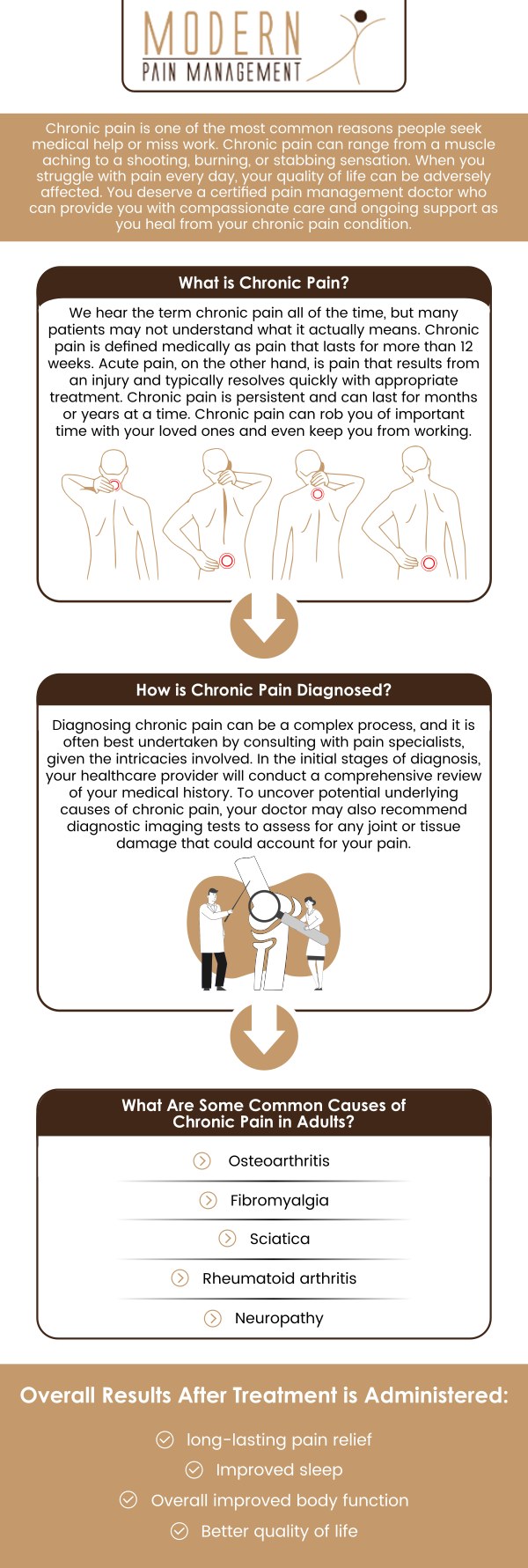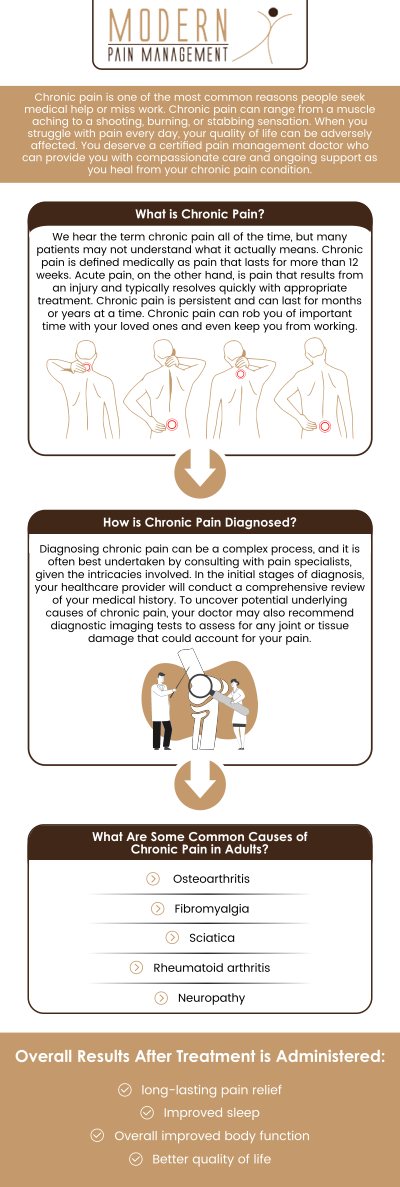What Are the Factors to Consider in Managing Chronic Pain?
Chronic or persistent pain is defined as pain that lasts more than 12 weeks despite medication or treatment. Most people recover from pain following an injury or surgery. However, occasionally the pain lasts longer or appears without a history of injury or surgery. Chronic pain can have a severe impact on your daily life and mental health. However, you and our doctors at Modern Pain Management can collaborate to treat it. We have convenient locations to serve you in Houston TX and Sugar Land TX. For more information, contact us or request an appointment online.




Table of Contents:
What are the factors that affect pain management?
What is the best way to manage chronic pain?
What is the most common cause of chronic pain?
Who suffers the most from chronic pain?
What is chronic pain, and why is it hard to treat?
Chronic pain can quickly start to get in the way of living your life comfortably, preventing you from being able to take care of your loved ones, as well as yourself. If you have chronic pain, it is critical that you see a specialist as soon as possible to prevent the pain from worsening and to help you find approaches and methods to manage your pain levels so that you can return to your normal life.
There are three categories of factors that can influence pain management; biological, social, and psychological. Some biological factors that will influence how you are able to manage your pain include your age, any pre-existing health conditions, your genetics, and the medications that you are able to take. Psychological factors that can affect pain management include stress, individual beliefs about pain, the quality of coping mechanisms that you have developed, your overall mood, and what your expectations are for the pain or treatments. Social factors are dependent on external factors, such as the support you receive from others, where the injury took place, your cultural beliefs, and the activities you perform on a daily basis. All of these factors can work together to make the pain that you are experiencing feel much more intense than it would otherwise. The level of pain you experience can be heavily influenced by your preconceived beliefs or feelings about that pain, and any emotions or thoughts can actually change the way that our bodies are experiencing that pain.
There is not one perfect solution for every single case of chronic pain, as the right treatment for one patient may not work at all for the next patient. However, some management strategies such as taking medication to help manage any symptoms and to allow the patient to move and exist as comfortably as possible, going to physiotherapy regularly, and reducing stress wherever possible in their lives are all very common recommendations for managing chronic pain. Many cases of chronic pain can actually get worse with a lack of mobility or stretching, so if it is recommended by a physician, movement and staying active is incredibly important to ensure that conditions do not worsen.
Chronic pain is most commonly caused by an underlying condition or injury that often develops with age or due to repetitive movements or positions. The most common conditions include lower back pain (often caused by sitting at a desk all day or standing and bending over for work daily), arthritis, and headaches. Some other common conditions that lead to chronic pain include multiple sclerosis, fibromyalgia, shingles, and nerve damage. Understanding the cause of chronic pain is the first step to treating or managing that pain.
The population that is most at risk for suffering from chronic pain includes adults who are over 65 years old. This is due to arthritis and other conditions developing with age and the wear and tear done to the body over the years. Chronic pain is often a symptom of other health conditions as well, many of which develop over time or with age. Additionally, chronic pain will worsen with time due to a lack of mobility, which is another factor that is more prevalent in the older population.
Pain is considered chronic once it outlasts the typical time frame of healing, often if it persists for longer than two to three months. The pain might be constant or come and go in waves. It can vary in intensity, happen anywhere throughout your body, and often start to interfere with your daily activities. It is different from acute pain, which is the pain that we experience due to breaking a bone or getting a paper cut. Acute pain goes away once the body has fully healed, but chronic pain persists after recovery from the injury or condition. Chronic pain can be very difficult to treat, as often it is impossible to find the source of the pain. The best approach to treatment involves several different methods, including relief from symptoms such as pain medication, exercising, and stretching. However, chronic pain can be incredibly complex, and it is possible that the most common approaches to treatment will not work in many cases, meaning that treatment and pain management often end up being entirely customized for each patient, frequently through a trial-and-error approach.
If you’re in pain and it doesn’t seem to be getting better, come to Modern Pain Management. Our pain specialists can assist you in finding relief so that discomfort does not stop you from living your life. We have convenient locations to serve you in Houston TX and Sugar Land TX. For more information, contact us or request an appointment online. We serve patients from Houston TX, Sugar Land TX, Pearland TX, Jersey Village TX, Missouri City TX, Stafford TX, and Richmond TX.
Check Out Our 5 Star Reviews

ADDITIONAL SERVICES YOU MAY NEED




